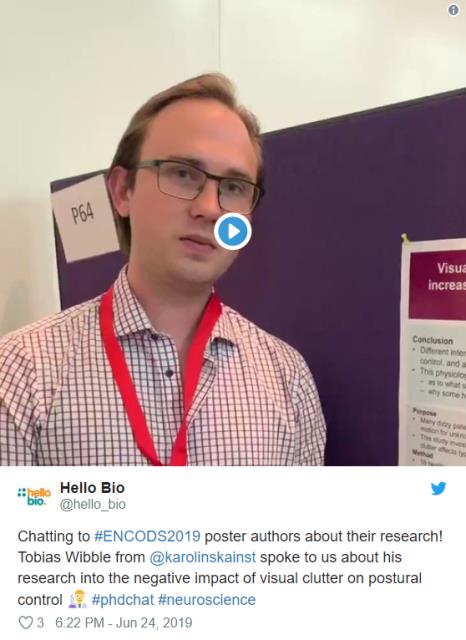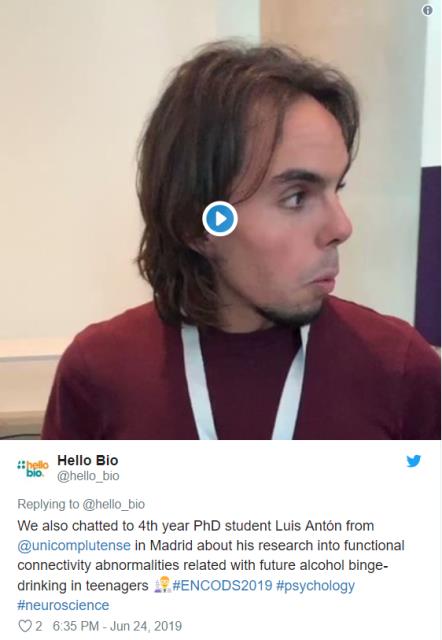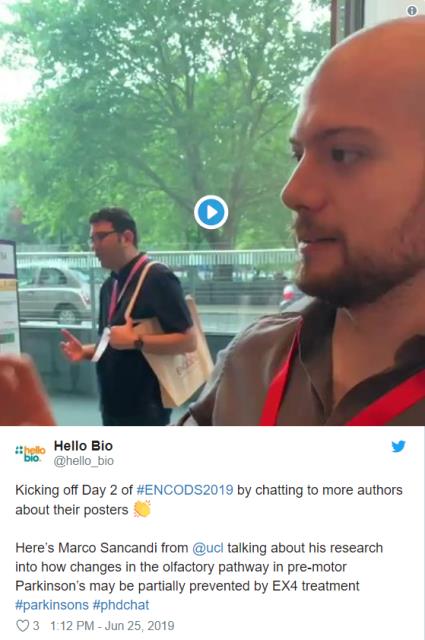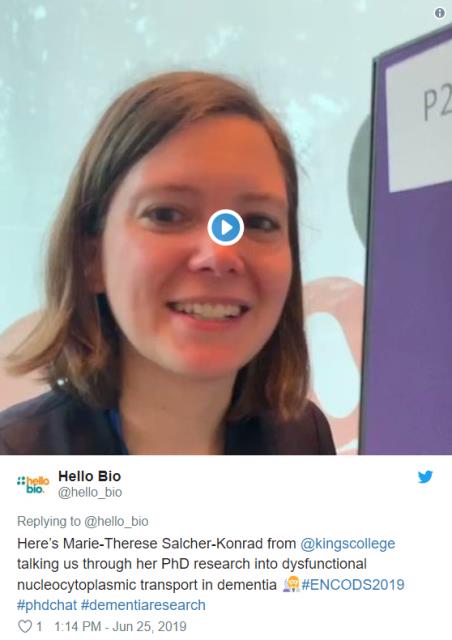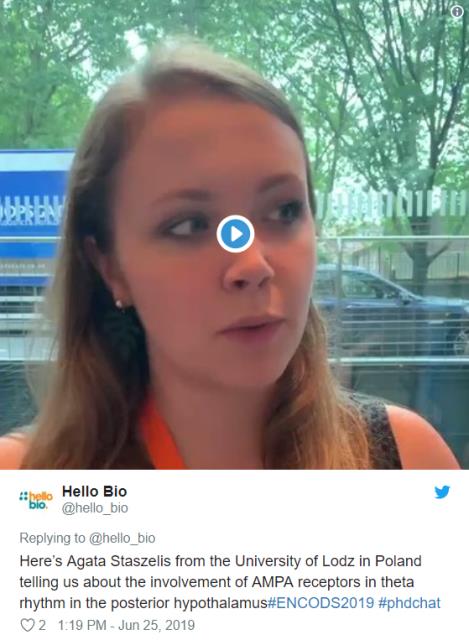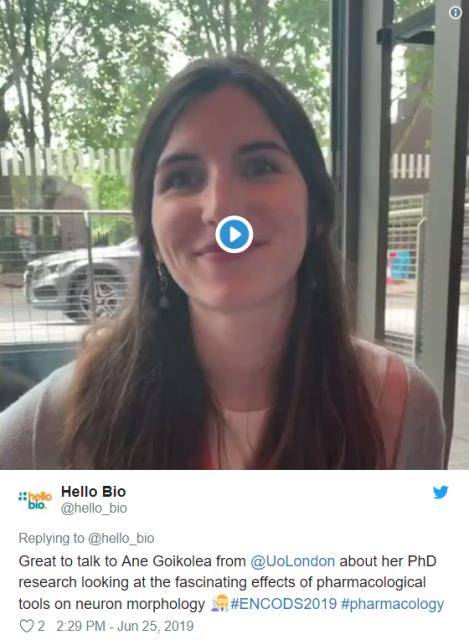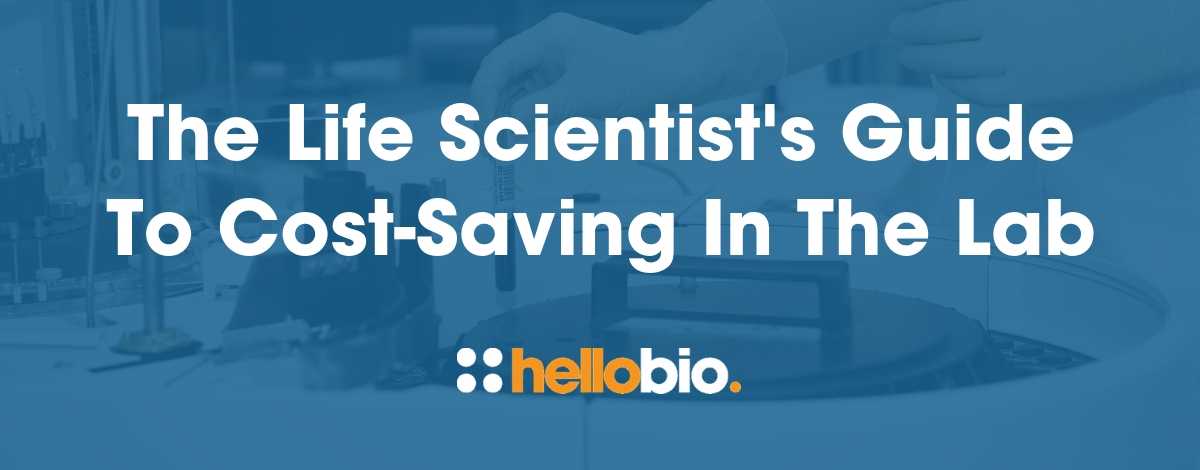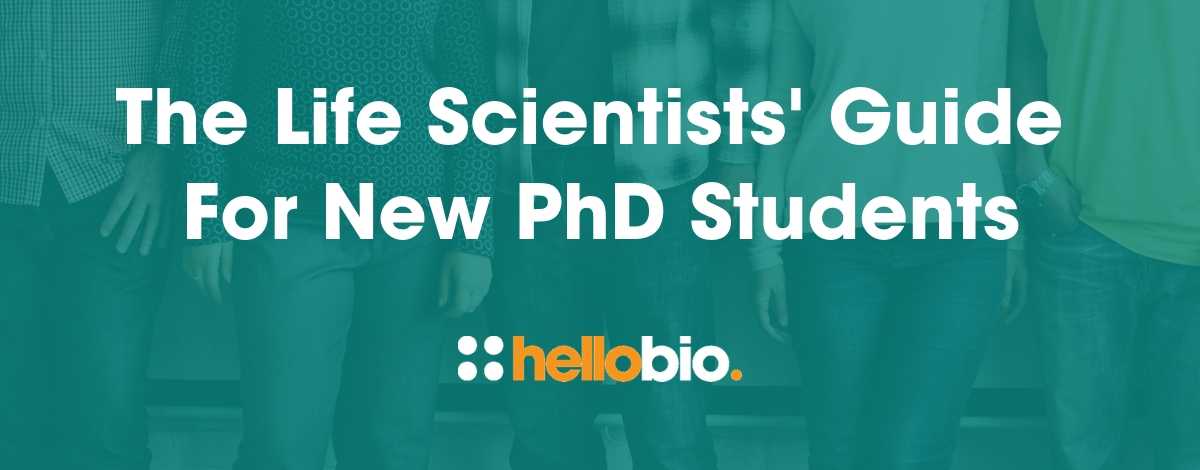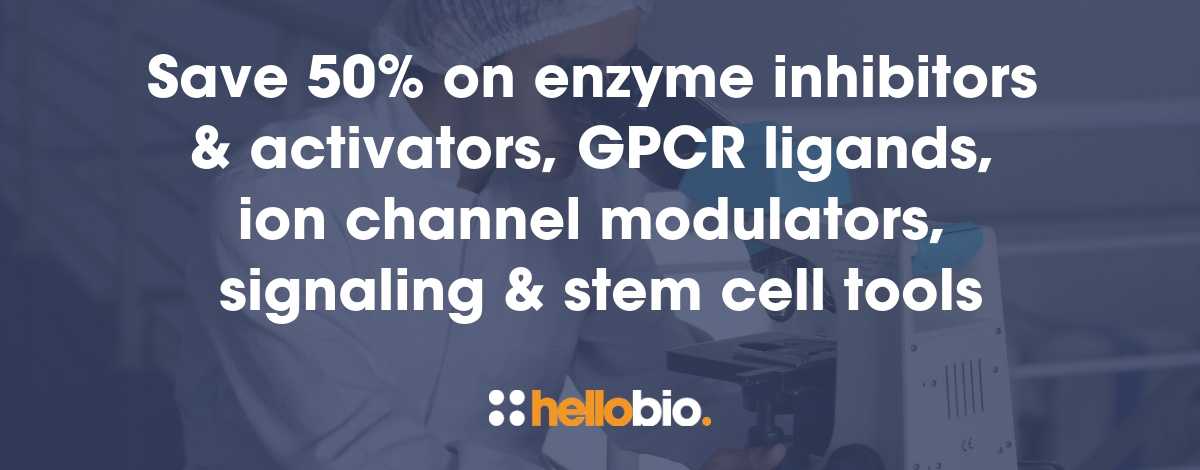ENCODS 2019: Our Highlights from the Annual Neuroscience Conference
Last month, we were delighted to be sponsoring and exhibiting at ENCODS 2019: a two-day event providing a platform for early-career neuroscientists from different backgrounds to meet fellow students and make connections with internationally renowned scientists.
The event was a great success, and we loved being part of it. In between meeting PhD students and postdocs and talking to them about their research and posters, we also attended some of the brilliant skills workshops, PhD talks, and lectures from eminent scientists Professors David Nutt, Sophie Scott, and Kia Nobre.
Here’s our round up of highlights from the two days!
Scientist Talks
Professor David Nutt
Professor David Nutt gave a fascinating talk on the psychedelic revolution in neuroscience and psychology. In particular, he spoke about the potential therapeutic uses of LSD, saying that the “...banning of LSD was one of the worst examples of research censorship”, likening it to the banning of the telescope in 1616.
He spoke about the history of psychedelic use – including how it was used by Nobel Prize winners Francis Crick and Kary Mullis – and shared results of studies which show instead of ‘firing up’ areas of the brain, psychedelics like psilocybin in fact ‘switch off’ certain control centres and take us back to a more primitive way of thinking. This then creates an opportunity to form new pathways, which could potentially help break negative thought patterns associated with depression.
Here’s the results of one study David shared, by Carhart-Harris et al in 2016, showing the improvement of patients with severe depression after 3 months:

One of the most memorable quotes we took from David’s talk was: “You cannot understand nature without exploring auto consciousness.”
And when talking generally about developments in science, although not related to psychedelics, another particular favourite quote of ours from David was: “If you get a hamburger, you can know that it’s not a horseburger - you just PCR it”
David is currently Professor of Neuropsychopharmacology and Director of the Neuropsychopharmacology Unit in the Division of Brain Sciences at Imperial College London.
Find David’s publications here: https://www.imperial.ac.uk/people/d.nutt/publicati...
Professor Kia Nobre
Professor Kia Nobre, from the Department of Experimental Psychology & Oxford Centre for Human Brain Activity, University of Oxford gave an illuminating talk titled: “Perceiving with the benefit of hindsight.”
Kia spoke about the challenges of understanding and exploring the mechanisms behind perception, selective attention, working memory, and cognition, and so much more! She also shared some of her fascinating results with recent human studies, and, just to check her audience were paying attention, tested them too...
Try them for yourself:
The Monkey Business Illusion by Dan Simmons [VIDEO]:
The Skoda Fabia Attention Test [VIDEO]:
Professor Kia Nobre is chair in Translational Cognitive Neuroscience at the University of Oxford and is professorial fellow at St Catherine's College and honorary fellow at New College.
Follow her on Twitter at @kianobre
Professor Sophie Scott

Professor Sophie Scott’s talk was all about the science of laughter, and was the perfect end to two brilliant days! Our personal favourite quote was: “Laughter is trying to kill you, it’s actually quite a dangerous activity.”
Sophie spoke about what laughter does to our body in terms of our breath and voice; how we perceive laughter as “an invitation to play”; how we’re 30 times more likely to laugh with other people vs. on our own; how we LEARN laughter; and it’s importance in strengthening and maintaining relationships.
Not only was Sophie’s talk absolutely fascinating, it certainly made us smile!
Sophie is soon-to-be Director of the Institute of Cognitive Neuroscience at UCL (from September 2019)
Follow Sophie on Twitter @sophiescott
Listen to Sophie’s podcast here.
Find out more about Sophie’s work on the Speech Communication Lab Website
PhD Talks
The PhD Talks at ENCODS were a fabulous opportunity for students to come together in a non-intimidatory, more relaxed environment, to talk about their research. The audience were encouraged to participate, with organiser / chair Margaux Silvestre from the Francis Crick Institute reassuring us: “No question is a stupid question!”
The talks covered a diverse range of neuroscience topics which included:
Sonja Meiser from Die Universität Oldenburg, who told us about how leeches can improve hand prosthetics
Oana Constantin from ZMNH who spoke about developing a new optogenetic silencing tool — the first light activated potassium channel in mammalian neurons.
One of our five registration fee waivers from our sponsorship for ENCODS, Adele Edwards from the University of Nottingham shared her findings on developmental neural stem cell responses in the spinal cord and the influence of pain.
Jessica Salles Henrique from the Federal University of Sao Paulo (another of our sponsored fee waivers) talked about cortical and hippocampal expression of inflammatory and intracellular signaling proteins in after physical training in vivo.
Lucy Granat from King’s College London gave a talk on her work investigating the role of the endoplasmic reticulum in neurodegenerative mitochondrial disease.
David Keller from Semmelweis University shared his chemogenetic evidence of a novel neuronal pathway conveying social input.
Rawan AlSubaie from University College London shared the findings on her functional and behavioral investigations of amygdala-hippocampus connectivity.
These are just a selection of the talks given by PhD students, and we want to say a huge well done to everyone who took part and shared their work!
Workshops
Presentation skills with Dr Emily Grossman
Dr Emily Grossman – science communicator, broadcaster, educator, author, speaker, and trainer – delivered a brilliant hour-and-a-half long workshop packed with actionable tips on improving confidence and communication skills.
During the session, we looked at ways to overcome nerves, techniques to boost your confidence, how to connect with your audience, and how to structure a ‘science story’ which keeps people engaged and that they remember.
Whether your next presentation is at a meeting, conference, seminar, or to your colleagues, read our blog post covering Emily’s top tips for being a brilliant science communicator.
We took so many brilliant notes, there was too much to share in this post!
You can follow Emily on Twitter here: @DrEmilyGrossman
Find out more about Emily and her work here: www.emilygrossman.co.uk
Watch Emily’s TEDx Talk here:
The Entrepreneurship Workshop with Jeremy Clifford
Jeremy Clifford from Entrepreneur First ran a workshop to explain how the programme works. He spoke about how EF invests in individuals, and how they can help scientists to find an idea which exploits their own personal competitive advantage – or “Edge”.
Jeremy shared lots of examples of successful companies that were born from the EF programme, and told us how the whole process works: from application, through to
finding a co-founder, developing an idea, and starting a company.
Entrepreneur First is the world’s leading talent investor. They invest time and money in “the world’s most talented and ambitious individuals”, helping them find a co-founder, develop their idea, and start a company. So far, they’ve helped 1,000+ people create 200+ companies, worth a combined $1.5bn. Check them out and see if they could help you at: www.joinef.com
Poster Sessions
We wanted to speak to as many scientists as possible about their posters, and lots of people were willing to chat to us on camera!
We shared them all on Twitter, and you can watch them right here:
Monday Afternoon Poster Session
Tobias Wibble from Karolinska Institutet spoke to us about his research into the negative impact of visual clutter on postural control:
4th year PhD student Luis Antón from Complutense in Madrid told us about his research into functional connectivity abnormalities related with future alcohol binge-drinking in teenagers:
Katerina Gialopsou from the University of Sussex told us more about her research into quantum magnetometers & advanced MRI using neuro-magnetic imaging:
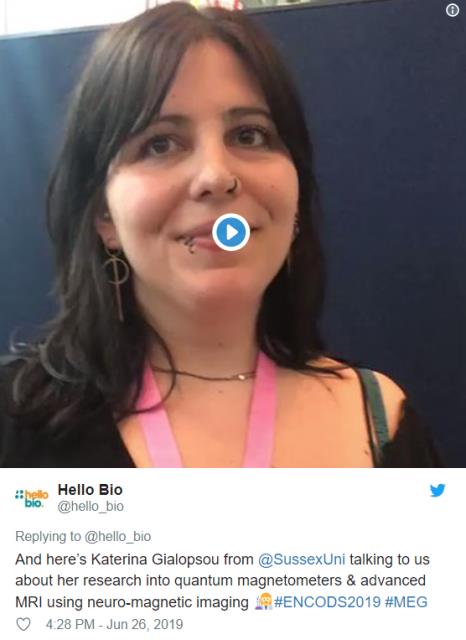
Marie-Therese Salcher-Konrad from King’s College London talked us through her PhD research into dysfunctional nucleocytoplasmic transport in dementia:
Agata Staszelis from the University of Lodz in Poland spoke to us about her research into the involvement of AMPA receptors in theta rhythm in the posterior hypothalamus:
And last but by no means least, Ane Goikolea from University of London told us more about her PhD research looking at the fascinating effects of pharmacological tools on neuron morphology:
Top takeaways and conference tips
And finally, we spent our time during breaks asking attendees for their top tips on making the most from conferences, or their top takeaways from ENCODS.
Here are their top conference tips:
“Engage, don’t be shy, we don’t bite!” – Valentina from UCL

“Prepare beforehand to identify the posters you’re interested in.” – Marie-Therese from King’s College London

“Network, be yourself, and have fun!” – Layla from University of Nottingham

“Get a good night’s sleep to make sure you’re in the right mindset.” – Agustin from Universidad Torcuato Di Tella

“Talk to people you don’t know, and make new friends.” – from this group of brand new friends!

And some top ENCODS takeaways:
“Treat your viva like a friendly conversation, not like an exam.” – Stuart from King’s College London

“It’s OK to change your subject and direction if you want to!” – Zeinab from UCL

And finally, Donald and Margaux, two of the brilliant ENCODS organisers, shared their tips for putting on an event:
“Always be ready with questions at talks and presentations!” – Donald from UCL

“Be flexible!” – Margaux from Francis Crick Institute

A huge well done to Margaux, Donald, and the ENCODS team for putting on such a great event. We hope to be back next year!
___________________________________
Our sponsorship of ENCODS 2019 contributed to five fee waivers, allowing five scientists to attend the conference free of charge! We had a chat to all of them to find out more about their work, and you can read their interviews here:
- Interview with Célia Domingos, PhD student at the University of Minho
- Interview with Adele Edwards, PhD student at the University of Nottingham
___________________________________
If you enjoyed reading this article, why not check out the other resources available on our blog for neuroscientists. We are really passionate about supporting scientists, including early-career life scientists and PhD students - with affordable reagents and biochemicals, travel grants, and resources to help with both personal and professional development. We know how tough it is - so we hope you find these helpful!
Advice & guidance for life scientists
Click below to view our of essential guides and articles includes to support life scientists, PhD students & early career life scientists:
Wellbeing for scientists
Click below for our resources to help improve your wellbeing:
Travel grants
Every month we give away $500 to PhD students and Postdocs so that they can attend a scientific conference - click below to find out more:
Technical resources
Try our Molarity Calculator: a quick and easy way to calculate the mass, volume or concentration required for making a solution.
Try our Dilution Calculator: an easy way to work out how to dilute stock solutions of known concentrations
Click below to see our Mini-reviews, Pathway Posters & Product Guides: a set of technical resources to answer your questions on a wide range of topics and to help you get started quickly.
And - when you get to the stage of planning your experiments, don't forget that we offer a range of agonists, antagonists, inhibitors, activators, antibodies and fluorescent tools at up to half the price of other suppliers - click below to see how we compare with other suppliers:






